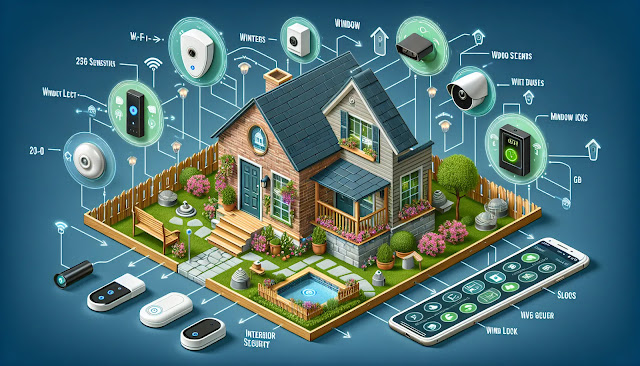Securing Your Smart Home: Essential Tips for Beginners
Protecting smart home devices
Welcome to the world of smart home devices, where technology has made our lives more convenient and efficient. With just a few taps on our smartphones or a simple voice command, we can control our lights, thermostats, and security systems without leaving our couch. However, with this convenience comes the responsibility of ensuring the security of our smart home devices. In this article, we will provide you with essential tips to secure your smart home and protect your privacy.
Smart home security
Smart home security is a crucial aspect that every homeowner should prioritize. As our homes become increasingly connected, they also become more vulnerable to cyber threats. Here are some essential tips to enhance the security of your smart home:
Secure your Wi-Fi network
The first and most important step in securing your smart home devices is to secure your Wi-Fi network. Your Wi-Fi network is the gateway through which all your smart devices communicate with each other. To ensure its security, follow these tips:
- Change the default username and password of your Wi-Fi router.
- Enable WPA2 encryption, which provides a higher level of security compared to older encryption protocols.
- Regularly update the firmware of your Wi-Fi router to patch any security vulnerabilities.
- Disable remote management of your router to prevent unauthorized access.
Use strong, unique passwords
When setting up your smart home devices, it is essential to use strong and unique passwords for each of them. Avoid using default credentials, such as "admin" or "password," as these are easily guessable by cybercriminals. Instead, create strong passwords that include a combination of upper and lowercase letters, numbers, and special characters.
Keep software up to date
Regularly updating the software and firmware of your smart home devices is crucial for maintaining their security. Manufacturers often release updates to fix security vulnerabilities and improve device performance. Enable automatic updates whenever possible to ensure that you have the latest security patches installed.
Enable two-factor authentication
Two-factor authentication (2FA) adds an extra layer of security to your smart home devices. With 2FA enabled, you will need to provide a second form of verification, such as a fingerprint scan or a unique code sent to your smartphone, in addition to your password. This significantly enhances the security of your devices and prevents unauthorized access.
Create a separate network for smart devices
Consider creating a separate network for your smart home devices to isolate them from your primary network, which contains personal computers and sensitive information. This way, even if one of your smart devices is compromised, the hacker won't be able to gain access to your personal data.
Home automation security
Home automation is a growing trend in the smart home industry, allowing homeowners to automate various tasks and make their lives more convenient. However, it is essential to ensure the security of your home automation system to prevent unauthorized access and protect your privacy. Here are some tips to enhance the security of your home automation system:
Use a reputable home automation platform
When choosing a home automation platform, opt for a reputable and well-established provider. Research different platforms and read reviews from other users to ensure that the platform prioritizes security and has a track record of regularly updating their software.
Disable unnecessary features
Review the features of your home automation system and disable any unnecessary ones that you don't use. Every enabled feature increases the potential attack surface for hackers. By disabling unnecessary features, you reduce the risk of vulnerabilities and unauthorized access.
Secure remote access
If your home automation system allows remote access, make sure to secure it properly. Follow these tips:
- Enable secure remote access protocols, such as VPN (Virtual Private Network), to create a secure connection between your remote device and your home network.
- Use strong passwords or two-factor authentication for remote access.
- Regularly monitor and review the remote access logs to identify any suspicious activity.
Monitor your smart home devices
Regularly monitor the activity of your smart home devices to detect any unusual behavior that may indicate a security breach. Keep an eye on your device's settings, network traffic, and logs for any signs of unauthorized access or tampering.
Secure voice assistants
Voice assistants, such as Amazon Alexa and Google Assistant, play a significant role in controlling smart home devices. To enhance the security of your voice assistant:
- Disable voice purchasing to prevent unauthorized purchases.
- Review and delete voice recordings stored by your voice assistant regularly.
- Consider setting up a separate voice assistant profile for guest users to protect your privacy.
Conclusion
Securing your smart home is crucial to protect your privacy and prevent cyberattacks. By following the essential tips outlined in this article, you can significantly enhance the security of your smart home devices and minimize the risk of unauthorized access. Remember to always prioritize security when setting up and using your smart home devices, and stay updated with the latest security practices and updates from manufacturers and service providers. Enjoy the convenience and comfort of your smart home while keeping it well-secured!






